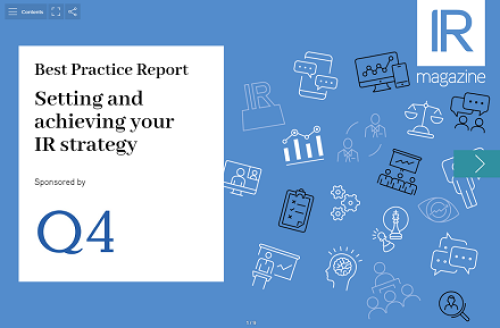A scoping paper commissioned by the UK government has suggested possible changes to Section 793 of the Companies Act, a key part of the law for IR teams that helps them uncover beneficial shareholders.
The paper, produced by the Law Commission, asks whether Section 793 could be used to help both companies and investor groups discover more information about the ultimate owners of shares.
Section 793 hands companies the right to demand information from intermediaries, like custodians and brokers, about their investor base. It is used by IR firms, operating on behalf of corporate clients, to conduct up-to-date shareholder analysis.
The comments on Section 793 are just one part of the scoping paper, which investigates the pros and cons of holding shares through a chain of intermediaries and the impact of this system on shareholder rights. The report does not offer recommendations but rather lays out options for future reviews to consider.
‘Where a company wishes to engage with its ultimate investors, it may struggle to identify them,’ says the paper. ‘Section 793 of the Companies Act 2006 provides a procedure for identifying ultimate investors, but consultees told us that it is not fit for purpose.’
The Law Commission identifies three ‘potential problems’ with Section 793: it does not require the disclosure of contact information, the information can go out of date quickly and investors cannot make use of it, only companies.
The paper says the first issue could be solved by amending the law so it requires not only disclosure of the identity of ultimate investors, but also their contact information. It questions whether the second and third issues have ‘obvious solutions’, however.
Maintaining a real-time or regularly updated register of beneficial owners would require ‘significant investment in technology and changes to the current system because investors’ positions change rapidly and often,’ notes the document. It adds that allowing investors to use Section 793 notices could become burdensome for companies and pose problems of verifying who has the right to do so.
Michael Sansom, head of UK registry at Computershare, tells IR Magazine the ability to identify beneficial owners is ‘an important issuer right given the focus on stakeholder engagement’.
He says his firm welcomes the publication of the Law Commission report and is supportive of discussions around possible improvements to Section 793.
‘It would seem sensible, for example, to consider requiring contact details to be included by investors in their disclosure notices, aiding engagement between companies and their investors,’ he says.
Other reforms
Other parts of the scoping study could also have an impact on how UK companies interact with shareholders. One of the main findings is that the intermediated securities system, while providing some benefits, leads many investors to lose out on their shareholder rights, such as voting at AGMs.
The report states that ‘targeted’ measures could be taken to improve the situation for end-investors, as well as to clear up legal uncertainties. It says future reviews should consider ‘the creation of a new obligation on intermediaries to arrange for ultimate investors, upon request, to attend meetings, vote and receive information.’
The Law Commission further suggests the extension of the Shareholder Rights Directive II in the UK to offer more rights to beneficial owners, not just direct shareholders – as is currently the case.
‘Millions of investors in the UK hold their investments through the system of intermediated securities, which has made trading easier and more efficient,’ says Sarah Green, commercial and common law commissioner at the Law Commission, in a statement.
‘But issues with intermediated securities mean investors are losing out on some of the benefits of share ownership and there is a potential lack of certainty. The reforms we have suggested would help ensure intermediated securities work for everyone.’










